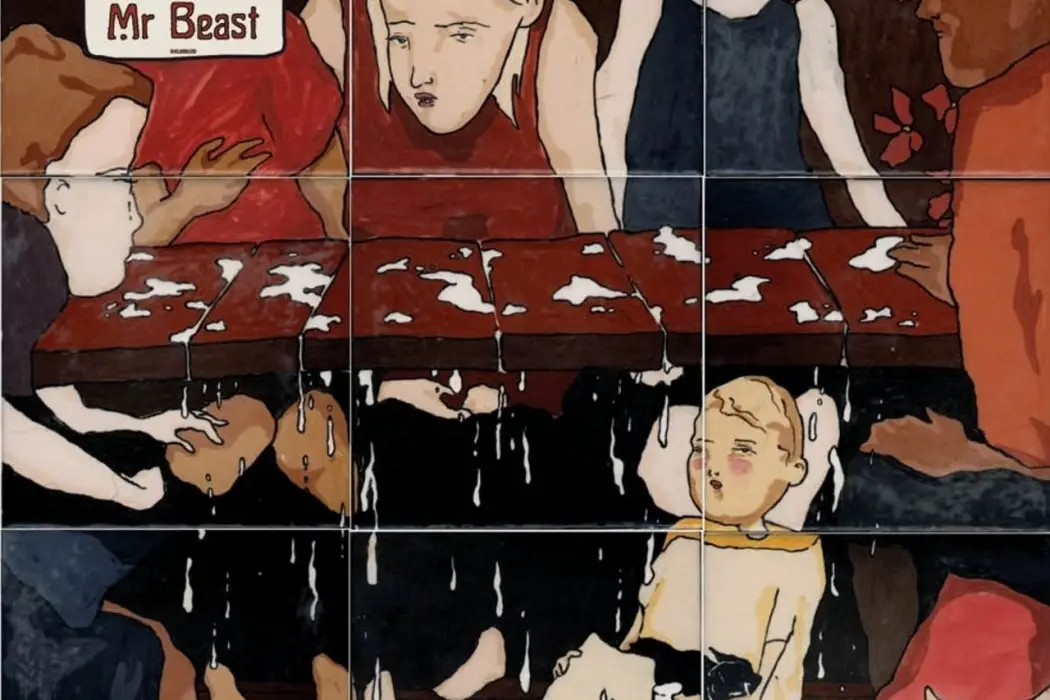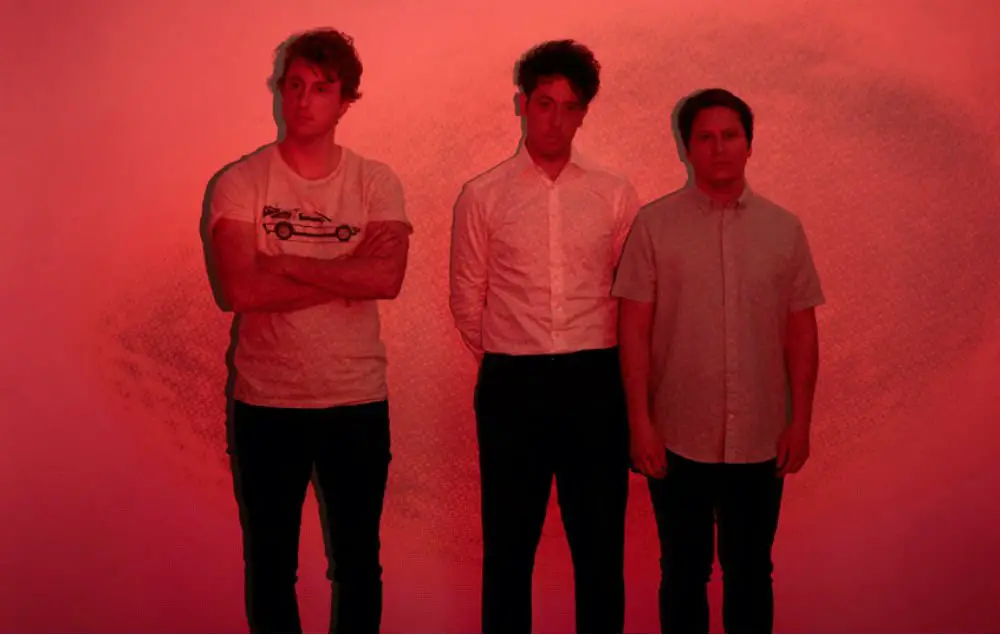Mogwai are not routine; the brutal, consuming, morbid curiosity with their style recalls Brian Eno’s more ambient affairs from the opposite end of the bell—it takes a day to observe, habituate and appreciate, it takes a mood to feel, mold and form to their music.
— —
Some might hate them. Some might not know what they got themselves in to. Some might be confused why they are still friends with Mogwai.
Yes, Mogwai, a benign name which belies a gremlin under the skin, a monster under the veneer of mild-mannerisms: in a way they are the very Mr. Beast who inspired the record’s name; a joke “funnier than life itself” after a series of seam-busting, seething 10-hour hell-in-a-cell contests and capital M-M-A-atches dragging you ragged to the edge.
But the appeal of Mr. Beast (released March 6, 2006) comes down to simple elements: soft, but not easy; relaxed, but not lackadaisical; post-rock, but not obnoxious. Abrasiveness can only get you so far, even Pearl Jam knew that, hence the gentler approach on Yield and Binaural. Hence Mogwai’s care with this record. Whereas Young Team and Come On Die Young were slapped together in haphazard disregard for the ears; whereas Rock Action was a redheaded stepchild third record; whereas Happy Songs for Happy People was made cold by deliberate lack of love, Mr. Beast more than any other is their baby. It was coddled and it will coddle for a good share, before leaving listeners to take some more knocks—“woodn’t wan’ ye gettin’ too sof’ now, wood we?” almost filters through the shearing spinal tap moments of “Travel is Dangerous” and “We’re No Here” with Glaswegian glee and a Cheshire grin.
Because Mogwai are not routine; the brutal, consuming, morbid curiosity with their style recalls Brian Eno’s more ambient affairs from the opposite end of the bell—it takes a day to observe, habituate and appreciate, it takes a mood to feel, mold and form to their music. A chaotic career-long cacophony built in tesseract bricks, a sixteen-cell structure threatening all hell to skelter but, when entered, harbors a meditative medina; they’ll do the trick more often than any New Age oasis record, challenging the yogi to find peace where it’s hardest to find—gusting grains of snow against ears rather than loosing them in lukewarm waters. Because who really needs meditation in a Bahaman tidepool? Still, Mogwai, Eno and New Age all share one common thread: they deny the hook. It might be the defining reason why patrons like John Peel were so adamant on the talents of these daring Scots. People will suck air raving on Joe Newman, Thom Sonny Green and Gus Unger-Hamilton for their anti-hook songwriting on the back half of An Awesome Wave, the choppy experience of This Is All Yours and then the Frankenstein monstrosity that is RELAXER, but they’re only the lastest in the line of rock n’ roll darlings using the anti-formula formula of delaying the selling point to the last possible moment.

Mogwai’s discography writes the rebuttal itself: With “We’re No Here” teetering on the sheer chalky cliffs of timbre they seemingly built stone by stone with “Like Herod,” “Ex-Cowboy,” “You Don’t Know Jesus,” or the colossal “Mogwai Fear Satan.” From these rhythmic ramparts nigh-devoid of melody, Mogwai claimed-conquered the Isles; Picts with a vengeance to prove Britpop a pretender to the throne. By Mr. Beast, Stuart Braithwaite, John Cummings, Dominic Aitchison, Martin Bulloch and Barry Burns dance over the grass-grown ruins; blissfully unawares to decadence they had come to outlive. The only sin for Mogwai faithful arising on “We’re No Here” might just be its legs, running twenty-seconds shy of 6 minutes, whereas its stylistic predecessors flirt or fly-by the ten minute mark. Likewise, this record is impeccable in it’s production; the only stumbling being “Acid Food” on loudspeaker—the cut is hard to differentiate all those guitar pieces without a pair of headphones. Hell, even with it’s still a barrow’s maze.
Where Mr. Beast does go meek, rests in the pacing gamut between “Travel is Dangerous” and “I Chose Horses.” Because it goes in such an up-and-down pattern, listeners sort of desensitize by the third mini-hill of this middle section and apply a brush of sameness to what should be quite sublime strokes of songwriting. Those pacing problems really do this record in—because there is no clear solution to the mid-section of Mr. Beast; the 1000-pound eleph-orilla in the room that breaks any intention of this record reigning as perfect. As individual pieces, they all work—but they overlap too much in mood and production not to feel interchangeable. One could have inserted any track in any order between “Team Handed” and “I Chose Horses” and the results would hardly differ.
The record plays in three modes over its runtime: the first category of songs includes the lovely “Friend of the Night” and “I Chose Horses”—largely piano based mixtures evolved from Happy Songs for Happy People, all with varying levels of scale but none greater than “Auto-Rock,” the most recognizable song of Mogwai’s canon ever recorded, layering any event, moment or instant with a sense of occasion like no other. It all comes down to that piano, playing all bleak black bars, all thin and squished between the thick white ivory. The melody breathes a life of its own, growing from toddler to child to teen to adult to senior to closer to death in the blink of an eye. Pair it with timelapses of flowers blossoming or lava cooling or Yellowstone bubbling; it doesn’t matter, “Auto Rock” will make whatever it touches bleak, inevitable, entropic and just plain awesome. The second mode comes along with “Team Handed” and “Emergency Trap” evolved from the ASMR operas of “Tracy” (Young Team) and “Take Me Somewhere Nice” (Rock Action) into palpable post-folk parables. Once again none greater than “Acid Food,” which in true Mogwai fashion, has something to say—but only in a whisper. Lyricism, like oil to water, sits apart from post-rock, not because they don’t write good lyrics, but because you’re not supposed to hear it. That said; even if you’re not supposed to hear them, cuts like “Acid Food” and “Travel is Dangerous” almost expect you still to know them after the umpteenth listen. Hell, the third part and parcel of “Acid Food” comes to.
What happened after the storm?
Was everyone OK?
I tried to call again
I think they’ve gone away
– “Acid Food,” Mogwai
The real star is that three guitar interplay. With John Cummings playing the main riff, Stuart Braithwaite the tiny melody and Barry Burns adding a rhythm guitar accent. It all adds up to soft waxy layers; sticky, yet moldable and incredibly satisfying to sink your ears into before taking the phones off, lest going deaf over the anti-hook crush that is “We’re No Here,” and which despite being the last cut on the record, is quite honestly the archetype that “Glasgow Mega-Snake,” “Travel is Dangerous,” and “Folk Death 95” all aspire to be yet fall short. In sum total, Mogwai plays like a fighter great in spurts, but unable to really string the bout all together in flawless victory. They score a lot of points; they make the right hook, and grab the right ear—they get the win, but it’s not a stampeding win; a win of thorough execution, it just kind of stumbles gauchely towards it, forgetting to dodge at times and getting headlocked at others. So this isn’t their best record. It’s their second best at best, most likely tied with Hardcore Will Never Die, But You Will. So why press people to listen to this Mogwai record over the likes of Young Team or the early EPs?

Stressing the same point when discussing the point with a close friend and musical guru in her own right, she asked it plain: “If you had one shot, with just one album, to convince somebody that a band is worth their time, which would you choose first between Young Team or Mr. Beast?“
Without hesitation, Mr. Beast. It comes as close as any record to balancing the post-rock timbre of classic Mogwai with the stark yet majestic piano pieces of Rock Action and Happy Songs for Happy People. It’s post-rock over easy; relaxing, even; a testament to Mogwai’s ability to sucker people into a genre that contains the far more calculated and cold Godspeed You! Black Emperor, the chaotic messes of Slint and Talk Talk and features guest appearances from the normally quiet and classical Sigur Rós. Mogwai plays all on feeling, with Mr. Beast, it’s still feeling, but now they’ve added a folkish warmth alongside chamber rock acoustics. And that’s why Mr. Beast ranks as my favourite: post-rock over easy. Not for want of layers, either, if you want it, the record has it—but say you need something on low for reading or doing chores or just to set a powerful mood without any nonsense lyrics in the way; Mr. Beast has your back; a trusted friend; an adult record.
No one likes a Mogwai record on their first try, not even Happy Songs for Happy People, with its crystalline cold execution and impersonal instrumentation. But with the warm and charming and funny and infamous Mr Beast, you just might want to save his number for a chat down the line.
— — — —

Connect to Mogwai on
Facebook, Twitter, Instagram
Discover new music on Atwood Magazine
? © 2019








